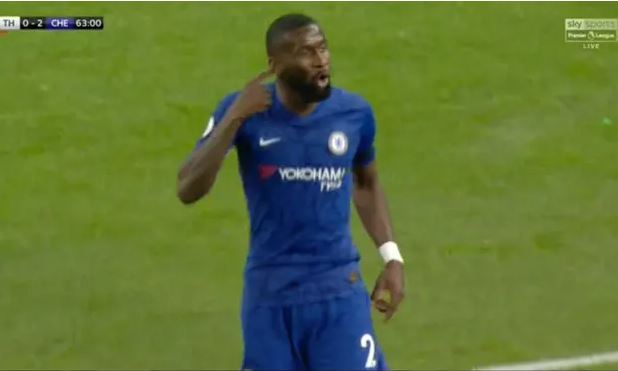The Premier League was once again blighted by racism after a match between Chelsea and Tottenham Hotspur had to be paused following abusive chants by a section of the crowd.
Chelsea defender Antonio Rüdiger was allegedly targeted by racist abuse from fans during the game on Sunday.
During the second half of the game, referee Anthony Taylor was then forced to stop the game when an object was thrown at Kepa Arrizabalaga, Chelsea’s goalkeeper, and Rüdiger complained that a supporter had shouted monkey noises at him.
An announcement about “racist behaviour interfering with the game” was broadcast twice to the crowd at the stadium in Tottenham, yet despite this only one allegation of racism was actually made.
Sadly, the incident is one of many over recent months, prompting the Professional Footballers’ Association (PFA) to take far more serious action: asking the Government to intervene and launch an inquiry into racism in the sport.
‘Tainted By Abuse’
In a statement, the PFA said: “Once again, a Premier League fixture has been tainted by abuse from the stands towards players.”
“We believe that the time has come for all governing bodies to unite collectively to end this abuse,” it continued.
“The PFA calls for a government inquiry into racism and the rise in hate crime within football and immediate and urgent action from an all-party group at the Department of Culture, Media and Sport to address this urgent issue.”
The statement was made to coincide with a meeting between sports minister Nigel Adams and the directors of Tottenham Hotspur about racist abuse on Monday.
He branded the incident “depressing” and backed an investigation launched by the team, tweeting: “There is no place for racism or any kind of discrimination in football or anywhere else.”
Meanwhile, Damian Collins, the Conservative MP who chaired the Commons’ digital, culture, media and sports committee, tweeted: “Racist abuse must be driven out of football stadiums. A review on how we can do more to achieve this should also include stopping homophobic abuse and requiring social media companies to do more to prevent abusive attacks against players on their platforms.”
Scotland Yard said it had been “made aware” of the alleged racist chanting during the second half of the game, and said that officers “will work with the club in an attempt to identify any people responsible”.
What Laws Protect Players From Racial Abuse In The UK?
Article 14 of the Human Rights Act 1998 states that all the rights and freedoms afforded to individuals by the Act must be protected and applied without discrimination.
Discrimination arises when someone is treated less fairly than another person in a similar situation without reasonable justification. It can also occur if you are disadvantaged by being treated the same as another person despite having different circumstances (for example if someone is pregnant or disabled).
Under the Act, it is illegal to discriminate against someone on grounds including gender, race, colour, language, religion, national or social origin, property, place of birth, and more.
Football clubs are not covered by the Human Rights Act because they are not public authorities, however the police (who are present at many football matches) are. The Government also has a duty under the Human Rights Act to ensure that criminal and regulatory laws adequately protect people’s rights, and therefore must ensure that the system as a whole protects people against racist abuse
Meanwhile, any abusive or threatening language directed against an individual who is classified under the The Equality Act 2010 as having a protected characteristic – like race – could be considered a hate crime.
The Equality Act doesn’t apply to individuals at football matches but it does apply to football clubs as service providers, so they have a responsibility to ensure football grounds are safe places for people of different races or other ‘protected characteristics’.
What Is A Hate Crime Defined As?
According to the Crown Prosecution Service, the term ‘hate crime’ can be used to describe a “range of criminal behaviour where the perpetrator is motivated by hostility or demonstrates hostility towards the victim’s disability, race, religion, sexual orientation or transgender identity.”
These different aspects which make up a person’s identity are known as ‘protected characteristics’.
Behaviours that constitute a hate crime under UK law include verbal abuse, threats, harassment, bullying, assault, intimidation, and damage to property – like graffiti.
Incitement to hatred of individuals with protected characteristics is also a hate crime.
How Does UK Law Respond To Perpetrators Of Hate Crimes?
According to the Law Commission, the law responds to hate crime in the following ways:
- Additional ‘aggravated’ offences with longer sentences in the Crime and Disorder Act 1998 if an offender demonstrated hostility or was motivated by hostility based on race or religion.
- Prohibiting conduct that is likely to stir up hatred on grounds of race, or intended to do so on grounds of religion or sexual orientation in the Public Order Act 1986.
- Enhanced sentencing under sections 145 and 146 of the Criminal Justice Act 2003 if hostility is motivated by any of the five protected characteristics.
- The provision of Sentencing guidelines. Section 125(1) of the Coroners and Justice Act 2009 requires that a sentencing judge must follow any sentencing guideline which is relevant to their case. This includes, for example, consideration of whether the offence was motivated by racial or religious hostility, or if it was motivated by or demonstrated hostility towards the victim based on one or more characteristics such as the victims’ age, sex, gender identity (or presumed gender identity), disability (or presumed disability) or sexual orientation.
It is scheduled to start consulting on whether hate crime legislation should be extended this year.
Do Football Clubs Have Their Own Initiatives To Tackle Racial Abuse?
The FA has strict guidelines on how to deal with any abusive incidents that happen within professional football grounds in the UK and a reporting procedure.
The association also has a number of initiatives aimed at making football more inclusive. This includes a drive for more BAME coaches and members of football boards, as well as encouraging women to take up key positions at club management level.
Third party organisation Kick It Out has been active for more than 20 years.
Working in partnership with the 92 professional clubs in the Premier League and English Football League, grassroots and community clubs across the country and within the education sector, its aim is to make football more inclusive. It receives and deals with reports of discrimination directly too.







